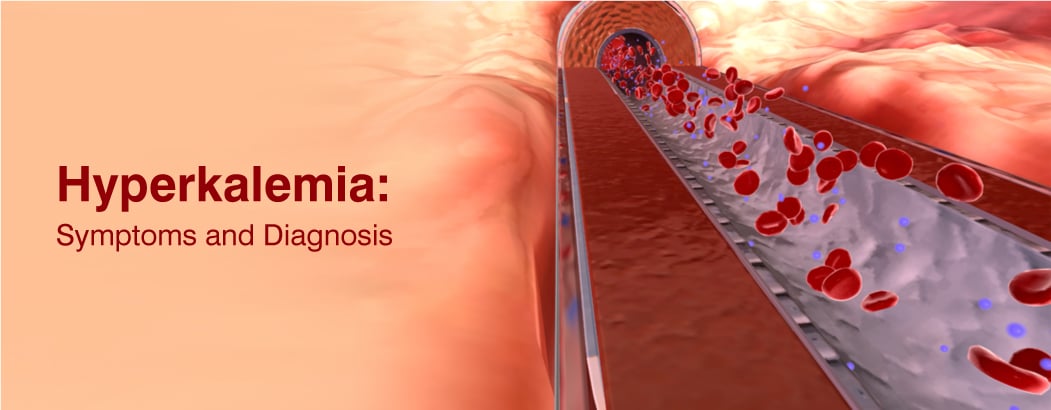Hyperkalemia: Symptoms and Diagnosis
September 11, 2023

Introduction
Hyperkalemia is a medical condition caused by extremely high potassium levels in the blood. Potassium is a crucial nutrient that supports the proper functioning of your heart, neurons, and muscles. Although harmful, having too much potassium in your blood might result in major heart issues, such as cardiac arrhythmias, muscle weakness, or paralysis.
Unfortunately, a lot of people do not experience hyperkalemia symptoms until it is too late and their cardiovascular health deteriorates. To better help you understand this illness, we will go over the causes, symptoms, diagnosis, therapy, and prevention of hyperkalemia in this blog.
Table of Contents
- Introduction
- Causes of Hyperkalemia
- Symptoms of Hyperkalemia
- Diagnosis of Hyperkalemia
- Treatment of Hyperkalemia
- Prevention of Hyperkalemia
- Conclusion
- Frequently Asked Questions
Causes of Hyperkalemia
Hyperkalemia can arise as a result of numerous reasons. These consist of:
- Kidney dysfunction: The kidneys are essential for preserving the body’s electrolyte balance, which includes potassium. Potassium can build up if kidney function is compromised in any way.
- Adrenal insufficiency: Addison’s disease, which can cause hyperkalemia, can occur when the adrenal glands do not generate enough hormones.
- Damage to tissues: Burns, trauma, and other conditions that harm bodily tissues can release too much potassium into the blood.
Symptoms of Hyperkalemia
Depending on how severe the illness is, hyperkalemia can present with a variety of symptoms. Typical signs might include:
- Weakness or even paralysis of the muscles can result from high potassium levels interfering with their normal function.
- Too much potassium can impair the body’s ability to produce energy, resulting in weariness and a general feeling of weakness.
- Potassium is required for an irregular pulse to maintain electrical signals in the heart. Palpitations or an irregular heartbeat may result from an imbalanced physique.
- Hyperkalemia also affects the nerves in a way that can result in the sensation of numbness and tingling in extremities.
Diagnosis of Hyperkalemia
Hyperkalemia is a disorder resulting from high potassium concentration. Its diagnosis requires a set of both clinical and laboratory studies. The diagnostic’s key components are as follows:
- As a matter of fact, when presented with an ill patient, the healthcare worker carries out a full medical history and physical examination to determine possible clinical manifestations as well as risk factors for hyperkalemia.
- Potassium levels in the blood are determined through blood tests like the basic metabolic panel or a complete metabolic panel. Normal for potassium is 3.5-5.0 mEq/L. Hyperkalemia means having a larger than normal reading, which is higher than this range.
- ECG vs. EKG: Often times, electrocardiograms (ECG) are implemented to measure one’s cardiac electrical activity. This disease alters the heart’s rhythm, which leads to some ECG distortions. In severe conditions, there could be a possibility of expanding QRS complex, tall peaked T waves, and even sinusiodal wave pattern. The anomalies in ECG may give useful diagnostic insights.
- The root cause of hyperkalemia must be determined since it can originate from various sources. Establish the underlying illness/medication responsible for increased serum potassium concentrations. They may require more blood test, imaging examinations, or other methods of diagnosis.
- Making an accurate diagnosis of hyperkalemia is essential for efficient management of the condition. The severity of hyperkalemia, the underlying etiology, and the existence of symptoms all influence treatment options often. To avoid potential cardiac problems and to manage the illness, an early and precise diagnosis is crucial.
Treatment of Hyperkalemia
There are a number of ways to manage hyperkalemia, which is characterised by elevated blood potassium levels, in order to bring them down and avoid consequences. Non-pharmacological approaches, in addition to drugs and tablets, can be successful. These non-pharmacological methods include:
- Dietary Modification: Avoiding or consuming fewer foods high in potassium can aid in managing hyperkalemia. Bananas, oranges, potatoes, tomatoes, and spinach are among the foods that patients are frequently recommended to reduce or completely avoid.
- Fluid management: Staying well-hydrated can help the kidneys excrete extra potassium through the urine. It can be possible to remove extra potassium from the body by consuming lots of water.
- Potassium Supplement Restrictions: Potassium supplements and salt replacements containing potassium chloride should be discontinued or reduced for patients under the supervision of a doctor.
- Lifestyle Modifications: Making changes to your way of life, such as getting more exercise and cutting back on alcohol, can help you maintain a healthy potassium balance.
- Regular blood tests and potassium level monitoring are essential for assessing progress and making any changes to the treatment plan.
Non pharmacological options for hyperkalemia control must be decided in close conjunction with a healthcare practitioner. Depending on the severity and underlying causes, these strategies can help keep potassium levels within a healthy range and minimize the risk of issues.
Prevention of Hyperkalemia
Consider the following recommendations to prevent hyperkalemia:
- Proper medication management: When taking potassium-raising medications as directed by your doctor, Check your potassium levels on a frequent basis when using such medications.
- Limit your intake of potassium-rich foods. Limit your intake of potassium-rich foods such as bananas, oranges, tomatoes, and spinach, especially if you have kidney problems.
- Stay hydrated: Drinking enough water might help keep potassium electrolyte balance in check.
Conclusion
A disorder called hyperkalemia is characterized by high amounts of potassium in the blood. Kidney disease, drug interactions, or tissue injury may bring it on. For an accurate diagnosis and effective treatment, it is essential to recognize the symptoms and promptly seek medical help. People can lower their chance of having hyperkalemia and maintain healthy levels of potassium in their bodies by taking precautions.
Frequently Asked Questions
1. Can hyperkalemia be life threatening?
Yes, severe hyperkalemia can be fatal since it can cause cardiac arrest and hazardous heart rhythms.
2. Can hyperkalemia be cured?
With the right care and lifestyle modifications, people with hyperkalemia can maintain potassium levels that are within the normal range.
3. Are there any specific dietary recommendations for hyperkalemia?
If hyperkalemia has been identified, it is best to limit your intake of foods high in potassium. For nutritional advice that is specific to you, speak with your doctor.
4. Can hyperkalemia cause muscle cramps?
Muscular weakness may result from hyperkalemia’s effects on muscular function. Muscle cramps can happen as a result of muscle weakening, even if they are not a clear sign of hyperkalemia.
5. Is hyperkalemia a common condition?
Particularly in people with kidney issues or those taking medications that have an impact on potassium levels, hyperkalemia is a relatively frequent condition. Early detection and management depend on routine potassium monitoring.








